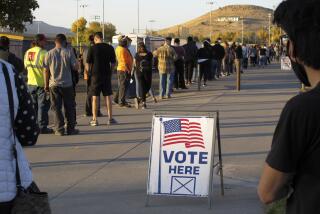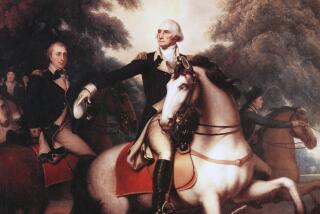Bicentennial Celebration of Constitution Will Be Pitched to the Ordinary American
- Share via
WASHINGTON — Whether they are watching prime-time television, going to church or even visiting the former prison on Alcatraz Island, Americans two years from now will have ample opportunity to mark the 200th anniversary of the Constitution, the oldest written document of its kind in the world today.
Such a prospect emerged from the wide array of plans unveiled last week during the first public meeting of the national commission that is promoting and coordinating the bicentennial celebration of the Constitution in 1987. Representatives of governmental, civic and private organizations emphasized the need to educate the public about the Constitution and make the observance appealing to ordinary citizens.
“I hope we will better understand what it means to be a free people,” said A. E. Dick Howard, a University of Virginia law professor who is chairman of that state’s constitutional bicentennial commission. “We must explain why Joe Sixpack, the average guy in the street, should care about the Constitution.”
Chief Justice Warren E. Burger, chairman of the 23-member national Commission on the Bicentennial of the United States Constitution, voiced hope that the observance would serve as a “civics and history lesson for all of us.” He recalled the controversy that surrounded the drafting of the Constitution and the widespread opposition that nearly blocked its ratification by the states.
“That’s the story we’ve got to get across,” Burger said. “The Constitution was a great struggle to secure, and it’s going to be a great struggle to keep it.”
One by one, spokesmen for nearly 20 organizations appeared in a crowded conference room at the Supreme Court to give the commission a preview of their bicentennial plans. Some examples:
--The American Bar Assn. plans to produce prime-time TV documentaries on the role of Constitution in modern life, to provide background for consideration of contemporary constitutional issues while remaining neutral on the issues.
--The National Endowment for the Humanities reported that it has already made more than $11 million in grants for conferences, seminars, research fellowships and other activities related to the bicentennial.
--The Daughters of the American Revolution will produce lapel pins, place cards, candy dishes and commemorative medals, and will ask ministers to celebrate the Sabbath with the Pledge of Allegiance, patriotic music and sermons about the importance of the Constitution.
--The National Park Service has designated a Constitution theme in parks across the country in 1987. On Alcatraz Island, the former maximum-security federal prison in San Francisco Bay, the service will stress the role of the Constitution in determining prisoners’ rights, protections against cruel and unusual punishment and native Americans’ rights. The island was the scene of an American Indian protest occupation in 1969.
--Washington’s Smithsonian Institution will open an exhibit on the Japanese-American experience in World War II. It will describe both the famed 442nd Regimental Combat Team, a highly decorated unit of Japanese-Americans, and the official decision-making that led to the internment of Japanese-Americans in this country during the war.
The commission also submitted its first official report, informing President Reagan and Congress that it will need substantial increases in funds and staff to perform its tasks successfully. It noted that, while the Congress had appropriated more than $118 million for the bicentennial celebration of the American Revolution in 1976, only $331,000 has been appropriated so far for the constitutional commission.
The commission asked that the law under which it was created be amended to allow it to raise revenue by authorizing production of commemorative coins and medals and raising the ceilings on tax-deductible donations tenfold, to $250,000 annually for individuals and $1 million for businesses.
The commission proposed that the bicentennial be celebrated over a three-year period, starting in 1987, to mark the anniversary of the writing of the Constitution in 1787, its ratification by the states in 1788 and the establishment of the federal government in 1789.
Also supported was a one-time national holiday, Constitution Day, on Sept. 17, 1987. Such legislation already has been introduced in Congress.
More to Read
Sign up for Essential California
The most important California stories and recommendations in your inbox every morning.
You may occasionally receive promotional content from the Los Angeles Times.













